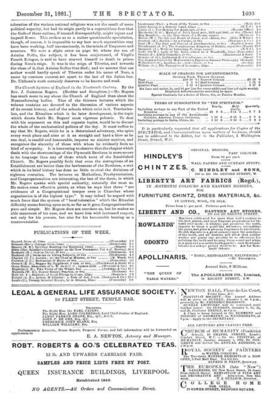The Church Systems of England in the Nineteenth Century. By
the Rev. J. Guinness Rogers. (Hodder and Stoughton.)—Mr. Rogers has much more to say about the Church of England than about the Nonconforming bodies. Niue of the thirteen lectures which the volume contains are devoted to the discussion of various aspects of its recent history, and of the schools which exist in it. Tractarian- ism, and the Ritualism which is its later development, is the topic which draws forth Mr. Rogers' most vigorous polemic. To deal with his argument on this and cognate topics, would be to discuss the whole of the ecclesiastical politics of the day. It must suffice to say that Mr. Rogers, while he is a determined adversary, who spies every weak place and aims at it as straight and hard a blow as he can deal, is candid and honourable, imputes no sinister motives, and recognises the sincerity of those with whom be evidently feels no kind of sympathy. It is interesting to observe that the chapter which deals with the shortcomings of the Plymouth Brethren is more severe in its language than any of those which treat of the Established Church. Mr. Rogers possibly feels that even the corruptions of an Establishment are better than the lawlessness of the Brethren, a sect which in its brief history has done no little to rival the divisions of eighteen centuries. The lectures on Methodism, Presbyterianism, and Congregationalism are interesting, the last of the three, in which Mr. Rogers speaks with special authority, naturally the most so. He makes some effective points, as when he says that there " are evidences of a Congregational temper even in Churches whose organisation is of the highest type." It may indeed be argued with -much force that the system of " local toleration" which the Ritualist difficulty seems forcing upon us is, so far as it goes, Congregationalism pure and simple. Mr. Rogers does not convince us, but he makes an able statement of his case, and we leave him with increased respect, not only for his powers, but also for his honourable bearing as a controversialist.






































 Previous page
Previous page